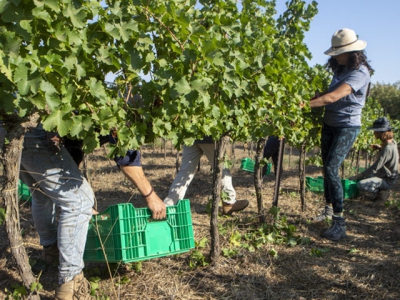Green and organic agro-products - Consumers new trend

To solve problems related to organic agroproduction, many solutions were proposed by leaders in the agriculture sector in a recent forum.
Fast growth in five years
On December 22nd, the Executive Team of the 970 Agricultural Product Connection Forum (Ministry of Agriculture and Rural Development - MARD) held a forum with the theme "Connecting consumption of organic agro-products in the Southern region".
According to Ms. Nguyen Van Huong, Head of Domestic Market Department, Agro Processing and Market Development Authority (Agrotrade Vietnam), organic agroproduction has grown both in width and depth in the last five years. The organic cultivation area in 2016 was 50,000 ha. By 2020 the number has increased to 240,000 ha. Organic products have been exported to approximately 180 countries and territories at present, owning an export turnover of over USD 300 million/year.
To further promote organic agriculture nationwide, the MARD has developed the scheme "Development of organic agriculture in the 2020-2030 period". The scheme is in line with the formation of circular agricultural models, aiming for export towards the standard of advanced countries in the world.
The agricultural sector focuses on a number of solutions: develop concentrated production areas; diversify production forms; research and promote new technology; develop human resources develop certificate validation organizations; and perfect procedures plus input material groups.
A recent survey conducted by Agrotrade Vietnam shows that consumers have the tendency to switch to green and organic agro-products. However, disagreements over costs as well as linkages in link chains make this process impossible to accelerate at the moment.
Mr. Le Thanh Hoa, Deputy Director of Agrotrade Vietnam, said that Vietnamese producers and consumers sometimes confuse fully organic products with partially organic products.
In his view, organic products must be completely standardized from seed, input materials, care techniques to packaging.
"Mentioning organic products mean zero problems related to residues or chemicals used. Before talking about added value, organic products must ensure hygiene and safety," said Mr. Hoa.
Building key models
As shared by Mr. Tran The Nhu Hiep, Deputy General Director of NHONHO Technology Co., Ltd., the organic farming procedure is now popular all around the world.
For businesses applying organic farming procedures in Vietnam, the main challenge lies in the limited production scale and area, lack of investment for capital and technology improvement, high input costs, and incommensurate income. Product consumption and distribution are also facing barriers in terms of consumer psychology.
Regarding development plans for circular agriculture chains, Mr. Le Thanh Tung, Deputy Director of the Department of Crop Production, emphasized the optimization of input materials as well as maximum utilization for by-products in the production process.
Agro-industrial by-products (AIBP) collection and use in Vietnam has just remained at the initial stage. There are not many domestic and foreign enterprises investing in this field.
“Unless we make full use of AIBP, a lot of resources will end up wasted. The income of farmers will accordingly become unstable,” said Mr. Le Thanh Tung.
A number of solutions given by the leaders of the Department of Crop Production include building pilot models for localities in need of organic agriculture development, or training management officials and skilled farmers based on the models’ actual implementation results.
Farmers respond to the organic agroproduction movement
Mr. Le Quoc Viet, Chau Thanh Farmers Association (Kien Giang), decided not to follow the high-yield rice production trend but “go against the flow” to produce seasonal crops. He harvests each crop after six months, one crop a year. The yield is 3 - 3.5 tons/ha. His ambition is to produce clean agro-products and preserve the life of seasonal crops for future generations.
Receiving many doubtful looks from other farmers, the man nicknamed "Tu Seasonal Rice" is now deploying a cooperative group to grow seasonal rice with a scale of 39 households with a total area of over 40 ha.
The seasonal rice - giant freshwater shrimp ecosystem of Mr. Viet is increasingly expanding, reaching an output of approximately 50 tons/year, equivalent to 30 tons of non-chemical rice. He also takes advantage of natural mud in the field to further develop shrimp farming.
Similar to Mr. Viet, Mrs. Dang Thi Cuoi, owner of Cuoi Quy Organic Vegetable Cooperative (Dan Phuong district, Hanoi), has been producing organic vegetables for many years.
From experiences acquired during her labor export to Taiwan, Mrs. Cuoi uses the "5 no" farming method: no herbicide spraying; no pesticides; no chemical fertilizers; no growth stimulator; no genetic modification varieties. Her goal is to efficiently protect the environment and "retain" natural enemies of the crop.
"The secret of our effective insecticide is to capture harmful worms, compost bioproducts to make microbial irrigation fertilizers for the plants. The worms that absorb this solution will keep getting weaker and eventually die," said Mrs. Cuoi.
Apart from the achieved results, many farmer households hoped that agencies and organizations will share and disseminate more experiences and knowledge about organic farming, and at the same time respond promptly to changes in the market.
Related news
 The VnSAT programme efficiently boosts coffee production
The VnSAT programme efficiently boosts coffee production VnSAT has aided cooperatives and cooperative groups in implementing coffee production processes in a systematic and highly successful manner via a variety
 VnSAT contributes to the sustainable development of coffee cooperatives
VnSAT contributes to the sustainable development of coffee cooperatives The Vietnam Sustainable Agriculture Transformation Project (VnSAT) has provided assistance to many agricultural cooperatives across the Central Highlands.
 14 agritech startups to watch, according to top investors
14 agritech startups to watch, according to top investors Climate change and a booming population make a revolution in farming vital to the world's health. Here are 14 agritech startups looking to change the game.